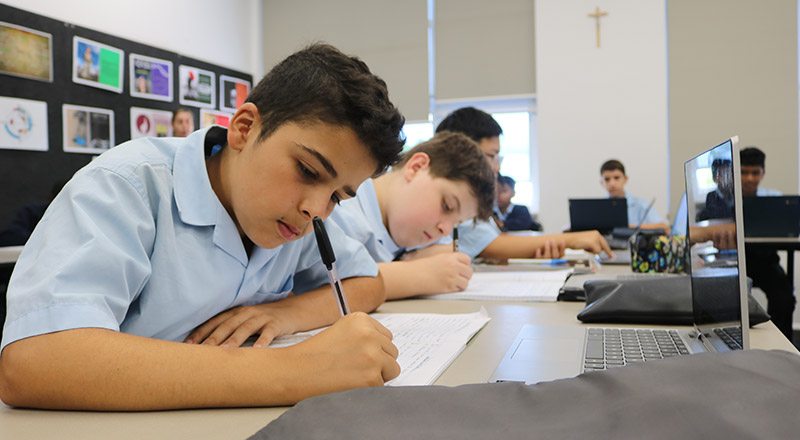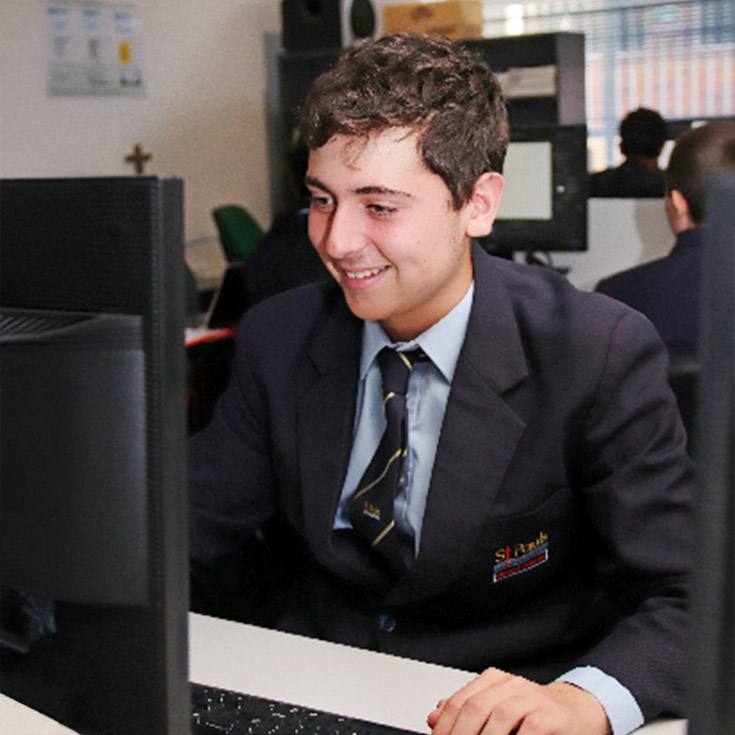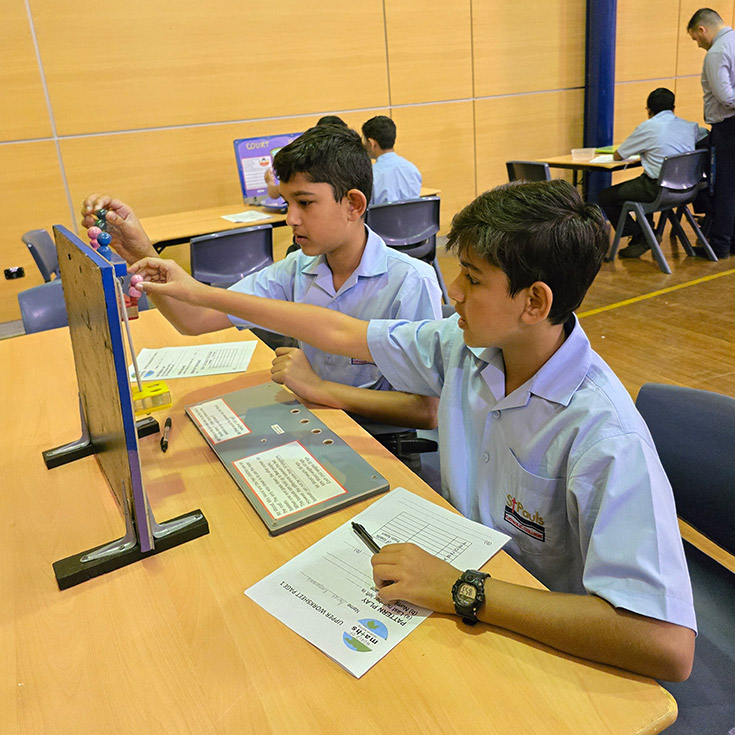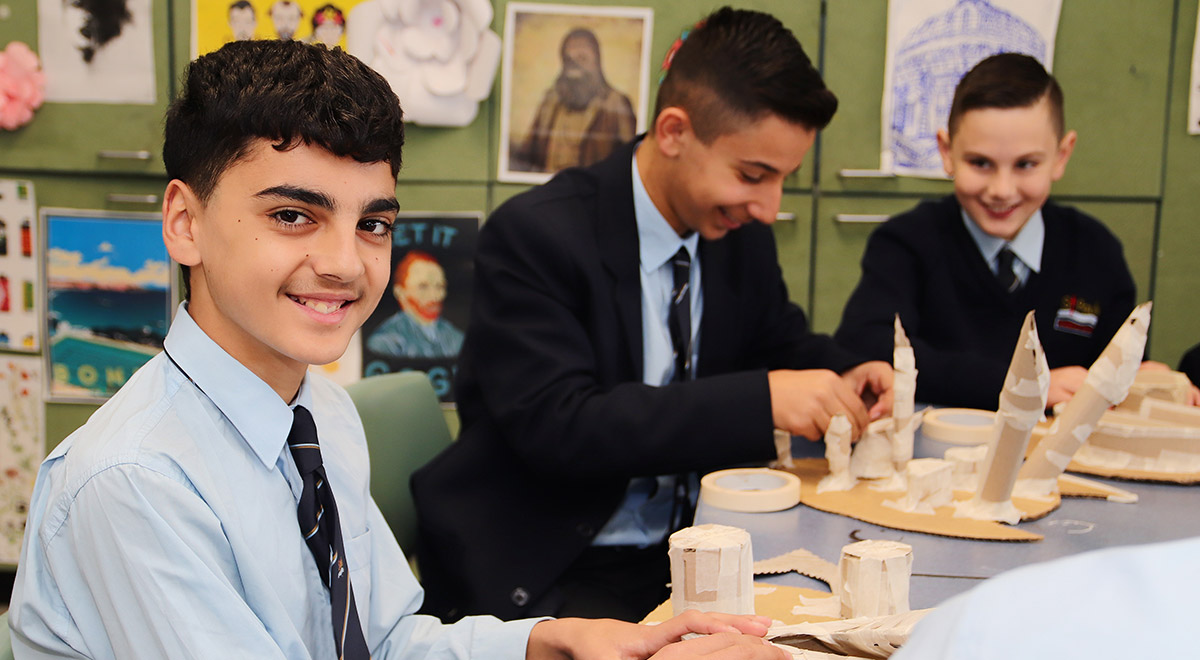Extending the learning of our more capable, dedicated and motivated students.
At St Pauls Catholic College selected students from Years 8 to 10 are offered the opportunity to undertake an extension program known as the Challenge Class.
These students delve deeper and wider into topics studied at school, with a focus on developing the students’ critical thinking, problem solving and collaboration skills. They are challenged in their thinking and ask to represent their understanding in original and creative ways.

Challenge Class FAQs
What is the Challenge Class?
The Challenge Class is an opportunity for students to extend their learning. Some of our students have an elevated academic ability across many areas and without extending these students they become bored and disengaged. As a result, these students fail to reach their potential. The Challenge Class offers a differentiated curriculum designed to enhance the knowledge and skills of these students. Real world scenarios are incorporated to enhance student engagement.
How are students selected for the Challenge Class?
Students who demonstrate high literacy, general reasoning, strong problem-solving skills and success across the core subjects are suited for the Challenge Class. A large pool of data is used to select students including NAPLAN, PAT testing and school-based assessment data. An offer is then made during Term 4 for the following year. The offer made to a student is valid for the completion of the school academic year.
What syllabus outcomes will the students address?
The students cover the same syllabus outcomes as the rest of their peers in their year group. However, the depth or breadth of their studies may vary from the mainstream program. The class is not an acceleration program, but an enrichment program.
How are the Challenge Class students assessed?
Students in the Challenge Class complete the same formal assessments (exams, major assessment tasks) as their peers in other class groups. However, the type and frequency of formative assessment (informal, in class work) completed in the Challenge Class may vary from that received in the mainstream class.
How are grades determined?
Grades for all students are based around NESA grade descriptors. These are used to allocate grades to all students across all subjects in all class groups.
How does the workload compare to the mainstream program?
The overall workload will not change for the students undertaking the Challenge program. Students receive differentiated tasks designed to enhance student knowledge and improve their problem solving, critical thinking and communication skills. There will not be more work, just work that may be more detailed or complex.
Does explicit teaching occur in the Challenge Class?
All students, regardless of what class group they are in, are explicitly taught using high impact teaching strategies shown to maximise student learning. Explicit teaching is where teachers clearly show students what to do and how to do it. Instruction is direct and structured. Students are guided through their learning to ensure success and will be encouraged to seek guidance when they find the work challenging.
How will students develop independent learning skills?
The learning tasks offered to the students in the Challenge Class are more open-ended and self-paced. Students are taught to self-assess their progress, as well as peer review their peers' progress. Students are encouraged to utilise feedback provided by both their peers and teachers to improve their performance.
What skills do the students focus on in the Challenge Class?
Higher order thinking skills are expanded in the Challenge program. Students spend a large amount of time working on inquiry tasks that require critical thinking, problem solving, collaboration and highly developed communication skills.
Why do the students need to sign a contract?
Teacher expectations for students in the Challenge Class are high, reflecting the program's commitment to excellence.
Students are encouraged to approach their learning with diligence and dedication. If a student faces difficulties meeting the program's demands, they will be supported and guided to address these challenges. Where its deemed necessary and in the best interest of the student, they will be moved back into a mainstream class. The contract ensures that students and their families understand the program's expectations from the start and students recognise the importance of applying themselves to the best of their ability.
What does literacy look like in the Challenge Class?
The students continue to engage in the College literacy LATD program. The use of exemplar texts continues, although the exemplar text used may differ from that used with the other class groups. The students will continue the writing focus, using high scoring sample responses to guide their understanding of best practice.
What if a student finds the Challenge Class does not suit them academically?
Some students may find that the Challenge Class does not meet their learning needs. If this happens, the student will have the option to withdraw from the class. If a student is struggling to cope for whatever reason they should speak with the Director of Pedagogy and Learning Analytics. We are committed to making sure every student achieves to the best of their ability and experiences success.
What happens if a student does not apply themself to their studies?
When a student is not demonstrating either the effort or standard expected in any subject, parents will be contacted by the Director of Pedagogy and Learning Analytics. The student will then have four weeks to demonstrate the necessary improvement, or their place may be offered to another student. Student places in the Challenge Class are reviewed at the end of each semester/reporting period or as the need arises.
How long does an offer for the Challenge Class last?
Students are selected for the Challenge Class during Term 4 of the current academic year for placement in the following year. Offers are extended in consultation with parents and are contingent on the student meeting the requirements outlined in the student contract.
If initial offers are declined, additional offers may be made to other students who demonstrate the necessary academic standards. All student data will be reviewed again in Term 4 of the following year to identify eligible students for future offers.







